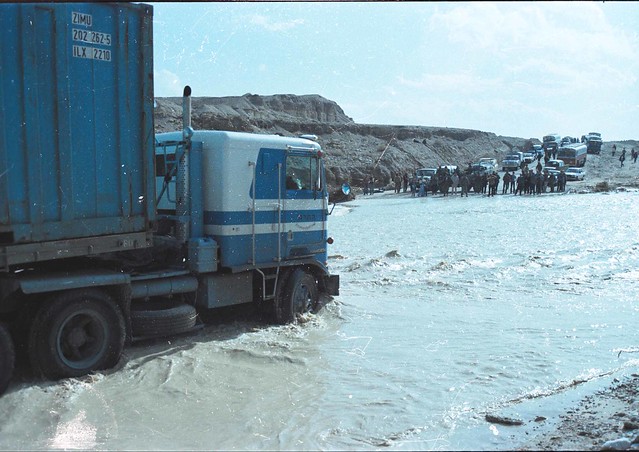New ownership regulations in Sinai

A
series of recent changes in the regulation of land and property
ownership in Sinai are said to protect national security, but to the
foreign residents and dual nationals of the area, the changes are
disconcerting and potentially economically damaging.
It all
started with Law 14 and its implementing statute, which were published
last year in the Official Gazette in January and September,
respectively. The law restricts land and property ownership in the area
to Egyptians who hold no other nationality, and who are born to Egyptian
parents.
Ownership for legal entities is limited to corporations
whose capital is wholly owned by Egyptians under the law. The law
further restricts usufruct rights to 30 years, extendable to a maximum
of 50 years if approved by the authorities, for foreigners.
Then,
Defense Minister Abdel Fattah al-Sisi in December, through Law 203/2012,
banned the private ownership, rental and use of nearly all land in the
span of the five kilometers west of the eastern border with Gaza and
Israel, with the exception of Rafah town. The law also bans the private
ownership, rental and use of land on islands, protectorates and
archaeological sites in the Red Sea Governorate.
South Sinai
Governor Khaled Fouda told Al-Masry Al-Youm in November 2011 that the
law seeks to allow land ownership while safeguarding national security.
These regulations are the latest in a series of legal measures addressing land and property ownership in the peninsula.
In
April 2005, then-Prime Minister Ahmed Nazif passed a decree restricting
the right of non-Egyptians to 99 years usufruct. A second decree in
2007 restricted the rights of Egyptian investors to 99 years usufruct.
Political implications
With
regard to Law 203, the ban on private ownership, use or rent of
borderline land in Sinai is “because of the military importance of this
region as a border line,” a military spokesperson told Turkish news
agency Anadolu last month.
The decree should be taken at “face
value” as a counter-terrorism measure taken in the light of the attacks
on soldiers, armed gangs incursions into Israel from Egypt and tunnel
activity, says Issandr El Amrani, a writer on Middle East affairs who
blogs on the Arabist, a widely-read site covering regional affairs.
Several
attacks on security targets and ongoing border infiltrations have been
facets of the uncontrolled peninsula, especially following the uprising
that toppled Hosni Mubarak.
“It is a straightforward prevention of
anything happening close to the border. The border is a very sensitive,
possible flashpoint,” Amrani adds.
“There is tremendous pressure
on Egypt to ensure that the area is under control. If something happened
there it could escalate very quickly,” he says.
The military ban
comes following and in contrast with earlier officials talk about the
possibility of opening a free trade zone between Gaza and Egypt to
encourage economic ties and cut down on the thriving tunnel economy.
Meanwhile,
some Bedouin leaders voiced their rejection of the decision, especially
because the ownership in the five-kilometer zone consists mostly of
Bedouin tribesmen. Ibrahim al-Meniei, head of the Sinai Tribes Union,
told Al-Masry Al-Youm that the tribes have given the government a
deadline of 30 January to reverse the decision.
Economic implications
Law
14, lawyer Zeiad Yehia suggests, had a “dramatic” effect on the real
estate market in Sharm el-Sheikh, where foreign investment is a key
player.
The implementing statute passed in September “added to the suffering of the Sinai real estate market.”
“Foreign
investment in the Sinai Peninsula, including Sharm el-Sheikh and Dahab
city has ceased completely, and now millions of Egyptians are starting
to suffer economically,” Yehia says.
The law has prompted panicked
reactions from existing landowners in Sinai. Of particular concern was
Article 8 of the implementing statute, which states that any Egyptian
who acquires a second nationality must sell his land or property to
single-nationality Egyptians born to Egyptian parents “within six months
of the date of application of these regulations.”
The unclear
wording of this provision initially prompted concern that the law would
be applied retroactively, and that dual national Egyptians who purchased
their property before the passage of the law would be obliged to sell
up.
Article 2 of the laws preamble states, however, that the law
and its implementing statute applies only to activities and projects
“still under construction,” and that existing projects are subject to
the law under which they were established until the expiry of their
terms.
State officials such as Fouda and General Shawky Rashwan,
head of the Sinai Development Authority, have also stated that the law
would not be applied retroactively.
Meanwhile, Nader Sharqawy, a
writer and member of the Free Egyptians Party who has lived in Sharm
el-Sheikh for 20 years, says that after a meeting with General Tareq
Saad Eddin, head of the Tourism Development Authority, Sinai landowners
and investors were given verbal assurances that the law is not
retroactive and that the prime minister is considering freezing the law.
Nationalist sentiments
But
dual national Egyptian property owners remain critical of the
distinction made in the law between single and dual national Egyptian
citizens, and the repercussions it will have in inheritance matters.
Murad
Mikhail, together with other dual national residents of Sinai, began
the “Ana Masry Gedan” (“Im Very Egyptian”) Coalition in response to the
law.
The coalition has held meetings with officials during which
property owners, investors and others sought clarity about such issues
as dual national rights and retroactivity under the law.
Mikhail, whose mother is German, says he “will never accept the law.”
“My
family has served this country for 50 or 60 years. With this law, they
took away my identity and I will never accept this, even if I lose
everything,” Mikhail says.
Hamdy Samy, an Egyptian-Belgian dual
national who runs a search-and-rescue service in Sharm el-Sheikh, moved
from Europe to Sinai in 1999 because he felt “reassured” about investing
in the area.
“When I read the law I felt humiliated. I feel
Egyptian and love my country, and youre telling me that because my
mother is Belgian, you categorize me as being less than a pure
Egyptian,” Samy says.
Samy is of the view that the law, which he
describes as “racist,” was passed to stop Israelis obtaining land
through mixed marriages or to allow the government access to land at
cheap rates.
Investors and workers rights groups in South Sinai
have sent a legal memo authored by lawyer Mamdouh Mostafa to Saad Eddin
in which they state that Law 14 flouts both the principle of equality
enshrined in the constitution and Egyptian nationality law, which does
not distinguish between single and dual national Egyptian citizens.
The
memo also points out that the law discriminates against dual national
Egyptians in the issue of inheritance by forcing them to sell any land
or property bequeathed to them, in violation of the civil code.
The
memo recommends that dual nationals be treated like single nationality
Egyptians, and that they be allowed to inherit property and land.
While
the right of dual nationals to inherit land is not explicitly stated in
the law, Article 2 states that, where land or property has devolved to
non-Egyptians by way of inheritance, the heirs must sell it to a single
national Egyptian with two Egyptian parents within six months.
“Are
Egyptians who have another nationality not Egyptian? There are
deliberate efforts to falsify facts. Were not talking about Egyptians
who hold another nationality, were talking about non-Egyptians. The text
is clear,” Rashwan says, giving the example of an Egyptian married to a
foreigner: When the Egyptian dies, his children would be allowed to
inherit his property, but not his wife.
The case is different,
however, when a single national Egyptian landowner in Sinai acquires
another nationality since the coming into effect of the law.
“He
has the right to usufruct. He can give up his other nationality — why
does he want it? ... You have to take into account that the other
nationality could be from the East or West, or even from neighboring
countries — and you know what Im talking about. Obtaining a second
nationality is a matter of volition,” Rashwan says.
On the matter
of dual national Egyptians born to one foreign parent who are denied the
right to own land in Sinai, unlike their single nationality
counterparts, Rashwan asserts that there exists a similar system in
other countries where land ownership is restricted to usufruct in such
cases.
Yehia suggests that although the aim of the law is to
protect Sinai land, “that protection has gone too far...and instead
destroys the very core of the Egyptian real estate foreign market in the
region and the dreams of millions of Egyptians for a better life.”
link




























 A
series of recent changes in the regulation of land and property
ownership in Sinai are said to protect national security, but to the
foreign residents and dual nationals of the area, the changes are
disconcerting and potentially economically damaging.
A
series of recent changes in the regulation of land and property
ownership in Sinai are said to protect national security, but to the
foreign residents and dual nationals of the area, the changes are
disconcerting and potentially economically damaging.




